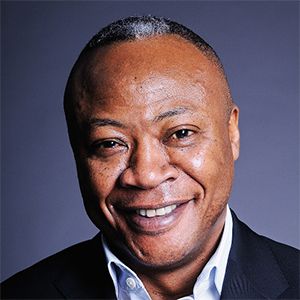Workplace diversity: why we need targets, data and holding people to account
)
René Carayol has seen a lot and he has a lot to say. Spend 30 minutes talking to him and you will walk away, your head filled with ideas of what it takes to find leadership, why quotas aren’t as important as targets and the private sector’s potential to drive change.
René is one of the world's leading business gurus specialising in leadership, culture, and transformation. He has worked with some of the Fortune 500's top CEOs and their executive teams, he has also been Chairman, CEO, and MD of blue-chip businesses. In his spare time, he’s also a best-selling author, with his latest critically acclaimed book, Spike, and a well-known TV presenter in the UK.
Ahead of his keynote speech at Legal Innovation & Tech Fest, René spoke to us about the hot button issues surrounding diversity, inclusion and equality. It’s the tip of the iceberg considering his vast experiences and wisdom on the subject that is highly sought by high powered people.
You have worked for and advised some of the world’s biggest names in business. Are there any that stand out to you as a particular highlight?
 A defining moment for me was 10 years ago working with The World Bank. I had the opportunity to work with Jim Yong Kim. He was well known to be an expert and a visionary, but not really considered to be a leader of people. In the three years I worked with him, he became one and living proof that leaders aren’t born but found.
A defining moment for me was 10 years ago working with The World Bank. I had the opportunity to work with Jim Yong Kim. He was well known to be an expert and a visionary, but not really considered to be a leader of people. In the three years I worked with him, he became one and living proof that leaders aren’t born but found.
In terms of diversity, inclusion and equality, The World Bank was way ahead of its time. When you walked into the head office, what you got was every nationality, every accent, every language, every faith. It was just an incredible building to be inside. They created a space of psychological safety, taking into account that they had to develop the capability to ensure that with so many different cultures they needed to value contribution, and every voice needed to be heard.
How has your approach to diversity, inclusion and equality changed over the years?
People of colour, people of different faiths, women, the disabled, the LGBTQ - we have felt the need to fit in. So much so that we sometimes lose who we are as we try to assimilate all the while experiencing microaggressions, unconscious bias, abject racism. At those times, the little voice in my head says, ‘do not react it's career limiting, you'll be labelled difficult’.
But since the tragedy of George Floyd, that has changed. Now I think it's career enhancing to speak up and to speak out. It's no longer appropriate to remain neutral. You can't be non-racist; you have to be anti-racist. I take it as incumbent on me at my vintage, and with the platforms I have, and maybe some of the status I have to be assertive, to be intentional and to speak up for others.
As reactions to the murder of George Floyd began to build and organisations either proactively spoke out against racism or were called on to do so, what impact did you see ahead for businesses?
So that changed our world. And up until then, there were many people asking: what is systemic racism? Does it really exist? What is institutionalised racism? Well, for eight minutes, 46 seconds, we saw it live and direct. That police officer didn't think he was doing anything wrong, he thought it was just another day at the office. As George screamed out ‘I can't breathe’ and cried for his life, the officer didn’t move a muscle.
The four days after that tragedy, my phone, my WhatsApp, my text messages went ballistic. It was white, middle aged, middle class men who I respect and admire, who are chairman and chief executives of major multinational companies. And they were all saying I want to do something, but what do I do? Where do I start? I don't know what to say, I'm going to say the wrong things. Where do I start?
I told them, ‘You're not going to be perfect; you will be clumsy, you will make some mistakes. That's okay. Be brave, be bold. If you’re bold, you might fail, but if you’re not bold, you will fail. As long as you're honest, authentic and your intent is right, people will support you.’
My observation is that the biggest gap isn't actually race. The biggest divide is generations. There's a generation that gets this. They marched together, they protested together. The BLM protests weren't all Black people. The allyship of a generation was loud, vibrant and necessary. It's an older generation, it's my vintage, who were the challenges, but no one is born a racist. If you were taught to hate, you can learn to love.
Beyond statements and gestures, what can be done to be better at overcoming systemic biases?
Guilt, blame and shame don’t build the future we need. In my talk I share the story of a program in London with the target of creating 10,000 Black graduate internships that was a resounding success, but it took time. What we need is to hold people to account. Get them to measure, get them to publish data, get them to show year on year, they're making a difference – but not point the finger at them for being transparent about where they need to improve.
Don’t miss René Carayol’s keynote speech at Legal Innovation & Tech Fest.

